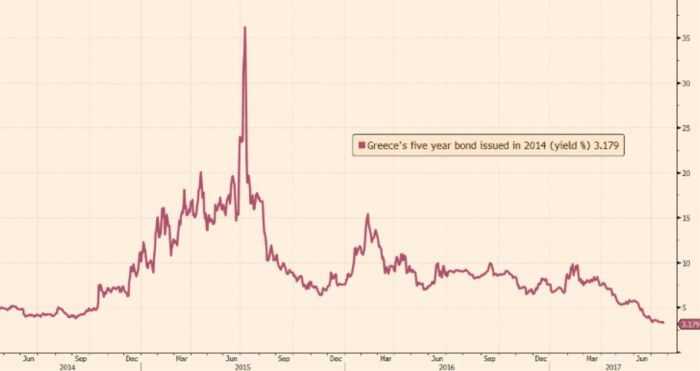Greece’s recent bond market return has been welcomed as a constructive step towards recovery from an economic depression that has lasted almost a decade. The economically troubled South European nation issued bonds for the first time in three years on 20th July 2017 – pricing 3 billion euros (3.5USD billion) of new five-year bonds with a yield of 4.625%.
1) So far So Good
The bond sale was a success and oversubscribed immediately – boosted by the fact that investors are desperately seeking the most attractive yields in todays market. According to Reuters, Greece employed six banks – BNP Paribas, Bank of America Merrill Lynch, Citigroup, Deutsche Bank, Goldman Sachs and HSBC – to act as joint lead managers for the bond sale. US investors purchased 44 percent of the new bonds, while Greeks bought 14 percent. The biggest share, 75 percent, of purchases were part of a bond-switch that exchanged older bond notes for those expiring in 2019.
2) What is the market sentiment?
Greece’s return to bond markets has been successful – with the issue from Europe’s most indebted nation attracting more than €6.5 billion in orders. Bond prices go up as yields fall and given the fact that the yield on this most recent issue is lower than that of the 2014 round (approx. 4.9%) the market is indicating enhanced value in Greece’s bonds. The success of the Greek bond issue has been helped by the upswing in the overall Eurozone economy – delivering growth consistently since the start of the year.

3) Will History Repeat Itself?
The last time Greece issued bonds to the marketplace was in 2014. The recent return into the sovereign debt market has understandably left some market participants wary of a rerun of past events. Greece has been in this exact position before – issuing debt twice in 2014 in an effort the raise funds to meet bailout requirements. The nation soon lost market access, in 2015 – due to failing to meet anti-austerity measures set out by its creditors.
4) What’s different this time around?
The political climate. In 2015, the election of the Syriza party, who held a referendum on Greece’s bailout terms, created turmoil in bailout discussions and led to the breakdown of productive talks. There was a failure to make positive structural change. This political conflict has been mostly put to bed with the Syriza party and Eurozone leaders agreeing terms amicably and the Greek economy returning growth in the first quarter of this year. However, the government’s approval ratings are sliding lower – this may create a cause for concern in future.
5) Bailout Exit Strategy
Greece has been working with eurozone countries, the International Monetary Fund, and the European Central Bank to arrange mutually agreeable terms for the bailout to continue. Greece has carried out fiscal reforms and austerity measures to the satisfaction of the other parties which has meant they have agreed more favourable debt repayment terms – specifically at lower interest rates.
The S&P credit ratings agency recently upgraded Greek government debt from stable to “positive” – based on expectations Greece will receive further debt relief from its EU creditors in 2018. Euro-area creditors and the IMF have provided a total of 226 billion euros in bailout funds to keep the Greek economy from sinking. The Greek government is planning to continue meeting those terms whilst concurrently raising funds through the further bond sales so that Greece can successfully complete a “clean exit” on this bailout debt.
6) What Next?
Greek Finance Minister Euclid Tsakalotos commented live on state-run ERT TV that the outcome of the bond sale, “was better than we expected”. The success of the new bonds has been driven by stronger economic and political policies in Greece combined with investors seeking the most attractive yields on investment. Therefore, it comes as little surprise that there will be a second and a third bond sale over the next year. Specifically, the finance minister outlined the target aim to exit Greece’s bailout program in August 2018. This might be an ambitious goal, but looking at the current market conditions, not an impossible one.
Sources:
- https://www.theguardian.com/
- https://www.cnbc.com/
- https://www.ft.com/
- http://www.reuters.com/

